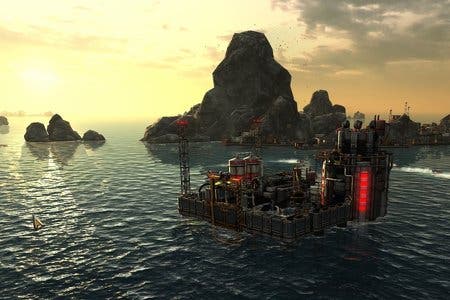Oil Rush Review
Slick or Spill?
In a submerged world, the man with the oil is king. He is the one who controls the flow of a battle. In Unigine's game, making mad grabs for oil derricks is something that you absolutely have to do, and that it ties into the theme so neatly is admirable. You send out your units and they grab. Derricks, nodes, factories, helipads. It's all quite elegant. It just took me a little while to figure out why.
Most games have silly names: Chronicles of Atalur or Call of Honour. They don't really mean anything. They're about evoking an idea, setting a mood, or if you're particularly lucky, establishing a premise. That's why I think I can be forgiven for ignoring Oil Rush as a title. I figured it didn't really mean much of anything. Also, the very last thing I ever want to do is rush.
When it comes to real-time strategy games, I'm a turtle. I hunker down, hoping the outside world will just go away so that I can carry on building my walls higher and my turrets bigger. I want to create a great big blob of men with guns, and then fling my arm in the general direction of the enemy, and have my horde cut a swathe through them.
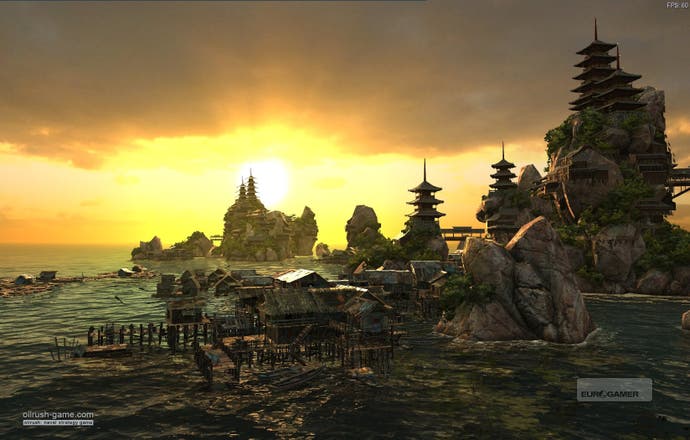
Oil Rush is not made for turtles. It's very much in the hare school of strategy games, as most are. But here, the blitz is king more than most, and if you dawdle for a second you're punished severely. It's a game about momentum and how hard you can swing that big old metaphorical pendulum around.
Oil Rush has no base-building; the bases are already built. It doesn't have production queues or any resource management. Each base churns out a specific unit type, from jet skis to boats to planes to helicopters, and they churn them out until they reach their specific unit cap. If any of their units get killed, they churn out a fresh one. So each game starts with a mad grab, a scramble for all of the best nodes, an attempt to consolidate and expand.
It's made for speed, both in how it plays and how long you play it for. Games are quick, clocking in at just over 20 minutes, and they operate at a breakneck pace that relies on you constantly switching between defending your bases and attacking new ones.
For a game where you can only ever control the base-nodes that litter the map, it's remarkably fluid. It's about managing your troops as a resource, knowing when and where to send them, and not being indecisive for a second. But it's quick-fire in the most powerful sense, because every decision is something you're locked into; there's no bottling and pulling your men back once they've been sent. Every trigger-pull is final.
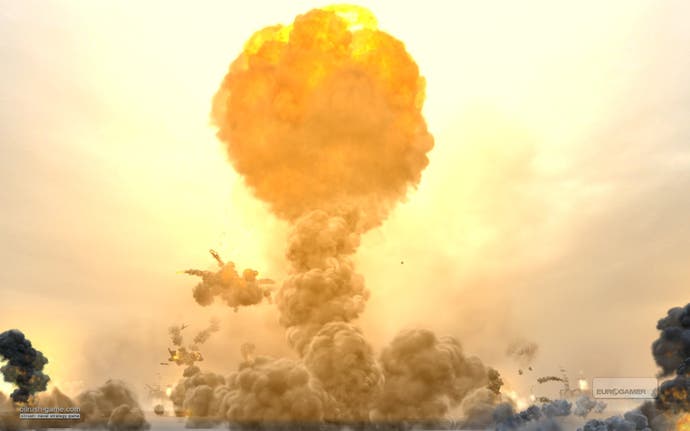
You can say how many of your troops you want to send, (25, 50 or 100 per cent of those at each node), but once they're gone you don't get control over them until they've arrived. Retreat really isn't an option. It's about creating little hordes and sallying forth hoping you won't get cut up in their turrets and defenders. Knowing which troops to send, too, seems essential early on, when each unit type seems to counter another, but soon enough you'll have enough of a mix in each group that it becomes redundant.
There's an extra layer of strategy in a tech tree, unlocked by earning experience from kills and capturing nodes, and it gets pretty crazy pretty quickly, with nukes, submarines, giant gunships and napalm strikes all unlocked fairly easily. But the early skills, like radars, propaganda and demoralisation, are the ones that you'll be using the most to turn the tide of fights.
And that's what the oil is for. It means that you'll always have units to send off, regardless of whether you've got a proper supply of oil going, but if you want to do the really cool stuff, if you want to reinforce and use those skills, you need a derrick or two. It necessitates aggression right from the start, and it's only because I'm stubborn and thick that I didn't realise that.
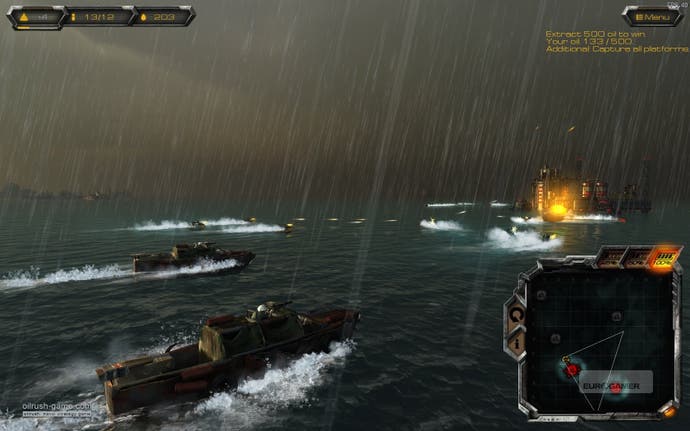
My thickness isn't entirely to blame, however. The campaign does a poor job of properly introducing its mechanics beyond the bare minimum, and the first few levels are so easy that turtling is a perfectly valid tactic. While admittedly they're a kind of tutorial, it meant that by the time I got onto the campaign proper, I had an entirely false impression of the game in my head.
It doesn't help, then, that it seems like the AI is cheating the instant things get tough. And it especially doesn't help that it punishes certain types of aggression even though they should work. Instead, you have to be aggressive in a very specific way that the game wants, rather than the way that feels like it makes most sense. The campaign is a bit of a misfire, despite having some really lovely environments such as sunken cities and rocky outcroppings covered in ramshackle housing.
Then there's the acting and script. All you need to know is that the hero is called Kevin and his commander is called Commander.
Luckily, there's fun to be had in the skirmish mode, where all the multiplayer maps are available to be played against the AI, which, it seems, isn't all that hot at the game. They rush a little, but never quite enough to put the pressure on you, and there doesn't seem to be a whole lot of difference between normal and hard. Fun, but the fleeting kind. Once you realise quite how much of a cakewalk the AI is, it's hard to keep your interest.
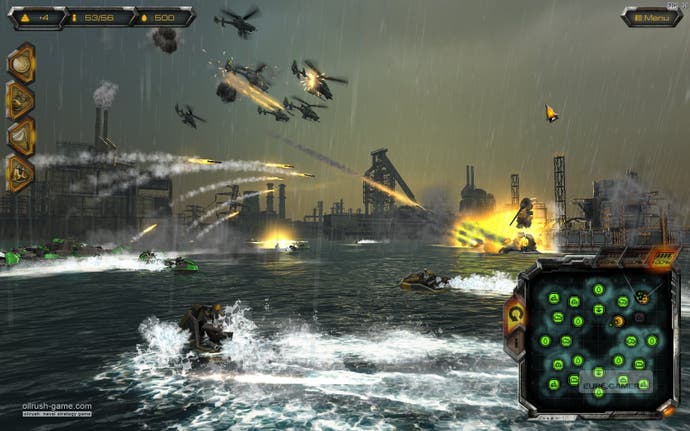
Which leaves the multiplayer. Once it's working, Oil Rush is surprisingly frenetic in multiplayer. That forced commitment - where once units are sent, they're sent - becomes a game of chicken that neither party can turn away from. There is no cowardice, only those who have the bottle to decide, and those who flail and make the wrong decision out of desperation. (I'll let you have a guess which camp I find myself in, more often than not.)
The problem is that it's difficult to get a game going. It works with Steamworks, except no one seems to hang out in a lobby for all that long, and even if you do rope in a bunch of friends to play it, if your internet connection isn't dangerously fast, it's going to start juddering and stalling as it tries to keep everyone synchronised. Which kills that speed and frenetic pace dead.
So what you're left with is a game that has a great little concept, a wonky campaign, AI bots that aren't quite up to the challenge of challenging you and somewhat dodgy netcode. It's incredibly frustrating, because the core concept works, and it works well. It's just all the rest that's falling apart at the seams.
